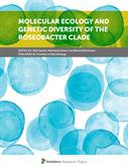Explore

Molecular Ecology and Genetic Diversity of the Roseobacter Clade
0 Ungluers have
Faved this Work
Login to Fave
Marine bacteria and archaea are key players in the biogeochemical cycling of nitrogen, carbon, and other elements. One important lineage of marine bacteria is the Roseobacter group. Members of this clade are the most abundant bacteria in marine ecosystems constituting up to 25% of the marine bacterioplankton. They have been detected in various marine habitats from coastal regions to deep-sea sediments and from polar regions to tropical latitudes. These bacteria are physiologically and genetically very versatile. Utilization of several organic and inorganic compounds, sulfur oxidation, aerobic anoxygenic photosynthesis, carbon monoxide oxidation, DMSP demethylation, and production of secondary metabolites are some of the important functional traits found in this clade. Moreover, several isolates are available allowing in-depth analysis of physiological and genetic characteristics. Although the Roseobacter group has been intensively studied in recent years, our understanding of its ecological contributions and the evolutionary processes shaping the genomes of this clade is still rather limited.
This book is included in DOAB.
Why read this book? Have your say.
You must be logged in to comment.
